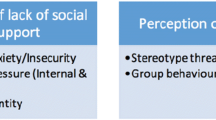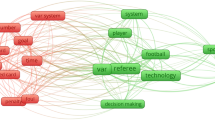Abstract
Poker is a competitive, social game of skill and luck, which presents players with numerous challenging strategic and interpersonal decisions. The adaptation of poker into a game played over the internet provides the unprecedented opportunity to quantitatively analyze extremely large numbers of hands and players. This paper analyzes roughly twenty-seven million hands played online in small-stakes, medium-stakes and high-stakes games. Using PokerTracker software, statistics are generated to (a) gauge the types of strategies utilized by players (i.e. the ‘strategic demography’) at each level and (b) examine the various payoffs associated with different strategies at varying levels of play. The results show that competitive edges attenuate as one moves up levels, and tight-aggressive strategies––which tend to be the most remunerative––become more prevalent. Further, payoffs for different combinations of cards, varies between levels, showing how strategic payoffs are derived from competitive interactions. Smaller-stakes players also have more difficulty appropriately weighting incentive structures with frequent small gains and occasional large losses. Consequently, the relationship between winning a large proportion of hands and profitability is negative, and is strongest in small-stakes games. These variations reveal a meta-game of rationality and psychology which underlies the card game. Adopting risk-neutrality to maximize expected value, aggression and appropriate mental accounting, are cognitive burdens on players, and underpin the rationality work––reconfiguring of personal preferences and goals––players engage into be competitive, and maximize their winning and profit chances.

Similar content being viewed by others
Notes
While the controversial UIGEA (Unlawful Internet Gambling Enforcement Act) in the United States, and similar restrictions on money flows in online commerce and poker in other jurisdictions, have tempered this growth somewhat in recent years, both online and live poker remain much larger than they were prior to the internet boom.
Due to computational limitations, only 120,000 of these NL50 players could be rated by PokerTracker. Regardless, this is still an enormous sample.
While this methodology is ideal for understanding the actual behaviors and consequences of players, from a “pure poker” standpoint the theoretical relationships between strategies, win rates and variance (i.e. standard deviations of win rates) would be better handled by simulation studies, which could keep player abilities, interactions, games and luck constant.
Other implications of this is that players will tend to play more tentatively and protect small wins, and play more aggressively during a losing session, desperately trying to get even at any risk or cost.
The only way to get information about folded hands would be to receive data directly from online poker companies themselves. Thus far, such sites have been very reluctant to release data.
Poker is rife with emotion work (Hochschild 1983) as well, from concealing one’s true feelings about the situations they are in (i.e. “keeping a poker face”) and dealing with adversity and maintaining emotional control and staying off “tilt”, where emotions cloud the ability of a player to make intelligent and optimal decisions (Browne 1989).
References
Akerlof, G. A. (1970). The market for “lemons”: Quality uncertainty and the market mechanism. Quarterly Journal of Economics, 84(3), 488–500.
Billings, D., Davidson, A., Schaeffer, J., & Szafron, D. (2002). The challenge of poker. Artificial Intelligence, 134(1–2), 201–240.
Boyd, S. H. (1976). Poker playing as a dramaturgical event: Bull power, the meaning and commitment for efficacious gamesmanship. In D. F. Lancy & B. A. Tindall (Eds.), The study of play: Problems and prospects: Proceedings of the first annual meeting of the association for the anthropological study of play (pp. 123–130). West Point, NY: Leisure Press.
Boyle, A. (2008). Poker-playing robots and more. Posted: Friday, July 11, 2008. Retrieved June 13, 2009, from http://cosmiclog.msnbc.msn.com/archive/2008/07/11/1195348.aspx.
Browne, B. R. (1989). Going on tilt: Frequent poker players and control. Journal of Gambling Studies, 5(1), 3–21.
Brunson, D. (1979). Super/system: A course in power poker. New York: Cardoza.
Caro, M. (2003). Caro’s book of poker tells. New York: Cardoza.
Craig, M. (2005). The professor, the banker and the suicide king: Inside the richest poker game of all time. New York: Grand Central Publishing.
Dalla, N. (2009). WSOP history––from Moss to Gold. http://www.wsop.com/wsop/history.asp.
Dalla, N., & Alson, P. (2006). One of a kind: The rise and fall of Stuey “the kid” Ungar, the world’s greatest poker player. New York: Atria.
Degeorge, F., & Zeckhauser, R. (1993). The reverse LBO decision and firm performance: Theory and evidence. The Journal of Finance, 48(4), 1323–1348.
DiMaggio, P. (2002). Endogenizing “animal spirits”: Toward a sociology of collective response to uncertainty and risk. In M. Guillen, R. Collins, P. England, & M. Meyer (Eds.), The new economic sociology (pp. 35–59). New York: Sage.
Duke, A. (2006). How I raised, folded, bluffed, flirted, cursed, and won millions. New York: Plume.
Elster, J. (1983). Sour grapes: Studies in the subversion of rationality. Cambridge: Cambridge University Press.
Espeland, W. N., & Stevens, M. L. (1998). Commensuration as a social process. Annual Review of Sociology, 24, 313–331.
Feinberg, R. A. (1986). Credit cards as spending facilitating stimuli: A conditioning interpretation. Journal of Consumer Research, 13(3), 348–356.
Gilovich, T., Vallone, R., & Tversky, A. (1985). The hot hand in basketball: On the misperception of random sequences. Cognitive Psychology, 17, 295–314.
Goffman, E. (1959). The presentation of self in everyday life. New York: Anchor Books.
Gordon, P. (2005). Phil Gordon’s little green book: Lessons and teachings in no limit Texas Hold’em. New York: Simon Spotlight.
Gray, L. N., & Tallman, I. (1987). Theories of choice: Contingent reward and punishment applications. Social Psychology Quarterly, 50(1), 16–23.
Greenstein, B. (2005). Ace on the river: An advanced poker guide. Fort Collins: Last Knight Publishing.
Griffiths, M. D. (1990). The cognitive psychology of gambling. Journal of Gambling Studies, 6(1), 31–42.
Hanusa, E. (2006). Full house: Raising a family on poker. Slate. Retrieved June 3, 2006, from http://www.slate.com/id/2144866/.
Harrington, D. (2004). Harrington on Hold’em (Vol I). Henderson, NV: Two Plus Two Publishing.
Harsanyi, J. (1986). Advances in understanding rational behavior. In J. Elster (Ed.), Rational choice (pp. 82–105). New York: NYU Press.
Hayano, D. M. (1982). Poker faces: The life and work of professional card players. Berkeley: University of California Press.
Heider, F. (1958). The psychology of interpersonal relations. New York: Wiley.
Hochschild, A. (1983). The managed heart. Berkeley: University of California Press.
Holden, A. (2005). Foreword in Winning low limit Hold’em, by Lee Jones. Pittsburgh: ConJelCo.
Kahneman, D., & Tversky, A. (1979). Prospect theory: An analysis of decision under risk. Econometrica, 47(2), 263–291.
Keynes, J. M. (1936). The general theory of employment, interest and money. London: Macmillan.
Knight, F. H. (1921). Risk, uncertainty and profit. Boston and New York: Kelley.
Kruger, J., & Dunning, D. (1999). Unskilled and unaware of it: How difficulties in recognizing one’s own incompetence lead to inflated self-assessments. Journal of Personality and Social Psychology, 77(6), 1121–1134.
Malmuth, M. (1999). Gambling theory and other topics. Henderson, NV: Two Plus Two Publishing.
Matros, M. (2005). The making of a poker player. New York: Lyle Stuart.
Matusow, M., Calistri, A., & Lavalli, T. (2009). Check-raising the devil. Las Vegas: Cardoza Publishing.
Mitrovic, D. V., & Brown, J. (2009). Poker mania and problem gambling: A study in distorted cognitions, motivation and alexithymia. Journal of Gambling Studies.
Newsweek. (November 20, 2009). High stakes for online gamblers. Retrieved November 23, 2009, from http://blog.newsweek.com/blogs/thegaggle/archive/2009/11/20/high-stakes-for-online-gamblers.aspx.
PokerTracker Strategy Guide. (2009). Aggression factor. Retrieved June 13, 2009, from http://www.pokertracker.com/products/PT3/docs/?doc=statref.
Sally, D. (2000). I, too, sail past: Odysseus and the logic of self-control. Kyklos, 53(2), 173–200.
Schwartz, M. (2006, June 11). The Hold’em hold-up. New York Times Magazine.
Sklansky, D. (2009). Poker, gaming and life (2nd ed). Henderson, NV: Two Plus Two Publishing.
Sklansky, D., & Miller, E. (2006). No-limit Hold’em: Theory and practice. Henderson, NV: Two Plus Two Publishing.
Spence, M. (1973). Job market signaling. Quarterly Journal of Economics, 87(3), 355–374.
Taleb, N. N. (2004). Fooled by randomness. New York: Random House.
Tallman, I., & Gray, L. N. (1990). Choices, decisions and problem solving. Annual Review of Sociology, 16, 405–433.
Tversky, A., & Kahneman, D. (1974). Judgment under uncertainty: Heuristics and biases. Science, 185(4157), 1124–1131.
von Neumann, J., & Morgenstern, O. (1944). Theory of games and economic behavior. Princeton: Princeton University Press.
Zelizer, V. (1997). The social meaning of money. Princeton: Princeton University Press.
Acknowledgments
The author thanks Tony Puddephatt, H. Ted Welser, Robb Willer and the Cornell Social Psychology Lab Group for helpful feedback and suggestions in regards to this project. The author also acknowledges Kim Burlingame, Janet Heslop and the Cornell Institute for Social and Economic Research for providing the computing resources and support necessary to make this project possible. Finally, the author is very grateful to HandHQ.com for providing access to the data which this research is based upon.
Author information
Authors and Affiliations
Corresponding author
Appendix
Appendix
Rights and permissions
About this article
Cite this article
Siler, K. Social and Psychological Challenges of Poker. J Gambl Stud 26, 401–420 (2010). https://doi.org/10.1007/s10899-009-9168-2
Published:
Issue Date:
DOI: https://doi.org/10.1007/s10899-009-9168-2




